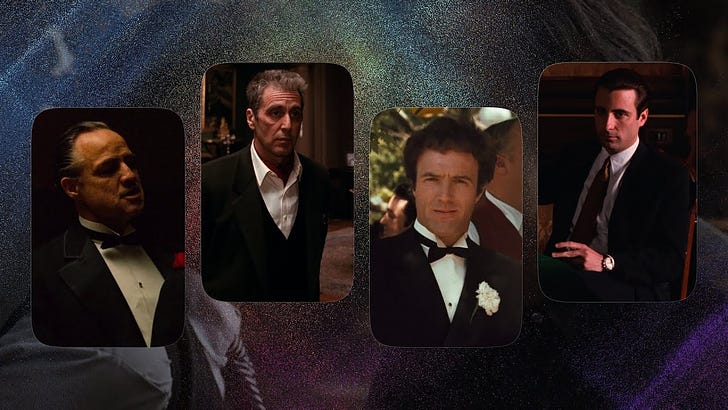This is not an analysis or a review, just my thoughts.
The Godfather is one of the few film trilogies I've watched multiple times, and that’s saying something, considering each movie is over two hours long. It's a great example of a classic film that will remain among the greatest in cinema history. Like many others, I also think this trilogy is one of the best for learning cinema and writing.
All three installments were released before I was even born, yet I can still enjoy the movie’s pace and understand the drama. I usually skip a movie if it drags for even a few minutes. Lately, I've started skipping after just a few seconds (the declining attention span!). If nothing interesting happens in a scene, I just close it. I don't seem to have the patience. The same goes for reading.
On the other hand, I watch slow-paced drama movies and series without skipping a bit. The same goes for reading lengthy and detailed essays. My only need is, there has to be something interesting worth knowing further.
The first chapter begins with a dialogue by a non-centered character1 and he captures the audience's attention with his story, setting the stage for everything that follows. And then Vito Corleone acquired the audience with his slow and measured talking style and subtle mannerisms.
Even though Marlon Brando only appeared in the first movie, most of us still associate Vito Corleone’s famous look with the entire trilogy. Al Pacino followed, delivering one of his best performances as well. One of my favorite aspects of this filmmaking is how characters sometimes communicate with just a glance, and the audience easily understands the unspoken words.
Storyline
Don Ciccio murdered Vito Andolini’s family and thus he had to escape to America when he was just a boy who didn't speak much. By the play of circumstances for survival, Vito Andolini became Vito Corleone and like any vengeful desire, he avenged his family. He had four children during this time and the trilogy spans the lifetime of his third son, Michael.
The way power is passed on and character transformation developed in this story is worth exploring. It shows how a young man, who was once uninterested in the family business and insisted he wasn't like his family, gradually turns into a man with power, and eventually, an old man, burdened with a heavy heart and deep sadness.
Both Michael Corleone and Vincent Corleone stepped into the limelight with the intent to eliminate their enemies—Sollozzo, McCluskey, and Joe Zasa. When Michael reveals his plan, the camera moves toward him, making him the center of attention. This scene marks Michael's transition from a nobody to a central figure in the Corleone family. It’s a crucial turning point in the story. Even though all his family members laughed at his idea, he was dead serious and then he pulled it off.
However, when Vincent suggested killing Joey Zasa after his wipe-out attempt, despite having warned about him earlier, Michael rejected the idea angrily. Yet, Vincent went ahead and did it while Michael was in the hospital, leaving Michael visibly frustrated when they talked about it later.
Michael began to offer more guidance to Vincent, just like Vito did before his death. Vito knew his enemies and betrayer’s patterns. He pointed out that before his death in a conversation “Now listen. Whoever comes to you with this Barzini meeting - he's the traitor. Don't forget that.”
Michael shared the same learnings with Vincent about Don Altobello.

Michael never wanted this life. His father, Vito Corleone, felt the same. But circumstances and tragedies pushed him into it. With great power comes great responsibility, and Michael eventually regrets some of his decisions, making him more miserable in the end. So when he got tired of the usual an eye for an eye, Vincent Corleone, Santino’s son came along willingly. But by then, Michael had learned a harsh truth, which he voiced openly before handing over all the power - "When they come... they come at what you love." It was a lesson he learned the hard way after being drawn into the family business.
Both Vito Corleone and Michael Corleone lost a child while they were alive. As the saying goes, losing a child while the parents are alive is the most painful loss.
Powerful dialogues, themes of revenge, and subtle gestures from this movie have influenced many films and series. If you read the screenplay of these movie series, you can feel if there’s a writer or reader or a director inside you.
If you like to build worlds, environments, and family histories through your writing, this is the best example to learn2. Detailed study of each character is worth exploring, because one can look simple but deep inside that character might be complicated.
I’ll keep continuing the tradition of watching this masterpiece every now and then.
If you're interested, check out the trivia on IMDb about these films. You'll learn a lot more about the trilogy. There's also a memorable quote by Al Pacino to the struggling Sofia Coppola: "When you get the urge to act, lie down and wait for it to pass."
Source: IMDb trivia
Another one is Game of Thrones!



